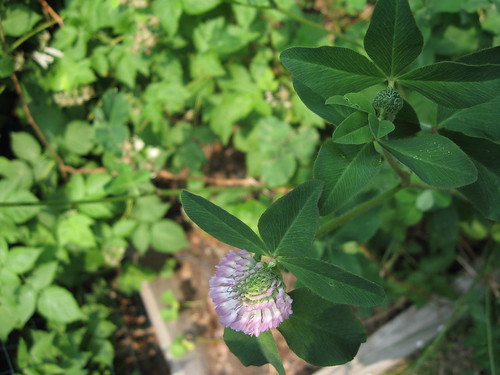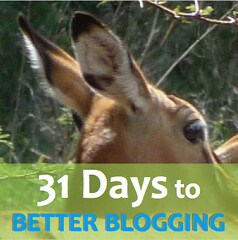Giving Space

Recently, Craver asked me about beneficial creatures. Not like teddy bears and housepets, but backyard creatures. The context was a conversation about leaving "edges" on one's property. Edges are the places where we let native plants grow as they will, to support what they will in terms of insects and wildlife.
I thought to bring the discussion up here to the post level, based on a conversation I had last night. I have this friend who knows all kinds of things. She was talking about bees. How their populations are devastated. Something like 70% gone. That's serious. Somehow, we've not been leaving the bees their edges, their spaces to live and do their thing. (All sorts of theories abound, including everything from cell-phone radiation waves messing up their homing ability, to pesticide application, etc. I suggest Googling the issue. It's interesting.)
So what have bees to do with leaving edges? It simply struck me that we have not been mindful on either the small level (our own properties) or the macro level (agriculture), and we are seeing the devastating results. Somehow this reminded me of a verse (oh, I don't feel like looking up the reference) that says, "Woe to you who join house to house and leave no room in the land for anyone but you." Yes, woe. But we can make a choice to be different. We can give space.
Clover on the Edge of My Garden, photo by L.L. Barkat.
Green Inventions Invitation: if you write a related post and LINK back here, let me know and I'll link to yours.
NEW LINKS TO THIS POST:
Aisling's Wild Edges
Labels: nature, stewardship










11 Comments:
This is really interesting, especially about the bees. I had no idea they were suffering. Thanks for bringing it to the post-level so we can all be more aware of these things happening.
My pastor is doing a three-week study on creation care, and we went to the first meeting this past Thursday. Part of our attempt to educate ourselves better about our responsibility in God's sight to care and tend to the earth, and also to learn what more practical things we can be doing locally to make a difference.
Food for thought here. Without our bees how do plants get pollinated. How careless we have been with our world.
I've been thinking about the "edges" of my own life lately, LL. Many circumstances outside of my control or planning have caused me to have very little margin in my personal life these days. When there is no margin, or edge, there is very little room to maneuver if something goes awry. The kids MUST nap for 1.35 hours, because I need that time to iron their clothing for the next event, because they need to be there in 2.15 hours, because then we have to be to the next event in 4.25 hours... Heaven forbid I should need to stop the car to fill up on gas, or get a phone call from an old friend who'd like to chat. That would just mess with the entire air-tight plan and send us completely off-course.
I do not like living with such small edges around my life. Like the bees, I need lots of flouncy, flowery, unmanicured, unplanned landscape within my daily routine. Thankfully, this season is only a season and there is an end in sight. And thankfully, busy seasons like this drive home the reminder that I am not Sabbath proof. Lest I forget.
I'm sorry that I don't have enough margin in my life to write a full-fledged post on this topic. I love the concept. But I did just see 7 or 8 bumblebees buzz by the window. Think I'll go out and watch them for a few minutes. :)
I've been reading about the bee situation for a few months. Now, when I see honeybees in my garden, along with other pollinators, I feel a surge of joy. I'm very concerned about this situation, but have lots of wild edges here. Unfortunately, where I live, we also have some invasive non-native plants, so our edges have to be groomed and tended a bit to be the best habitate for native species.
Christianne... yes. I had heard that bee populations were diminishing, but I had no idea it was this severe. It does vary from region to region, with some areas having an even higher percentage devastation. I hope you blog a little about your study. I would love to hear what you are learning.
Greenearth... apparently, without bees pollinating, humanity would have about 4 years to live (this was an Einstein speculation if I remember correctly)
Erin... I love how you make this parallel. I wonder if this all begins in our own lives. If we begin to give ourselves space and care, perhaps we can better understand such necessities for all creatures. (Oh, and the bumblebees are a little less affected than than the honeybees. I don't know why.)
Aisling... I feel the same way. Such a small gift, the bees in my garden. I realize we must remember the power of these gifts for life and joy.
LL -- I have an edge of property that I am trying to work on as a good place for critters (maybe if they have their own space, they won't mess with my vegetable garden!). It's interesting to "plan" and edge, however. Seems sort of counter-intuitive. Also, it's one of the few times in my life I've thought, "If I were a bug, would I want to live here?" :)
By the way, this honey bee crisis is disturbing. Apparently it hasn't hit us as hard in Indiana as in other places; I was just discussing the problem with some beekeepers at the farmers' market on Saturday.
Charity... oh, that's funny about planning an edge being counterintuitive. I just mow up to a certain point and then that's it. I let nature do the rest.
As far as your conversations with the beekeepers go, I would love to hear more about that.
i had a "wild" edge near my clotheslines that is just blooming with wild strawberries! it's the sweetest gift from the Lord and they will not be removed...
Aimee... ooooo! Ship me some!
THis is crazy, you know? When I was a child, we ate wild strawberries until we could eat no more. Now, I can't find a single strawberry anywhere, so assaulted is my surrounding landscape.
l.l., I linked back here today when I posted about 100 things that live and grow in the wild edges of my property (in honor of my 100th post!) :)
I have been reading about this in National Geographic and Smithsonian. I hope it is not too late to right or wrongs.
teeth whitener
Post a Comment
<< Home